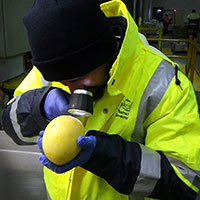Tasmania’s Securing Our Borders

Tasmania’s Securing our Borders (SOB) initiative that was announced in May 2019, has significantly strengthened the state’s biosecurity system to keep pests out and protect vital primary industries, the environment and tourism sectors.
The initiative has boosted frontline resources, helping to keep Tasmania relatively free from economically significant pests and diseases. A key benefit of the pest free area status is the maintenance of grower access to premium export markets.
A central component of the SOB initiative was a substantial increase in the number of inspections being undertaken by BT Inspectors on produce assessed as being at an elevated risk of carrying pests. The primary pests being targeted are fruit flies but other pests such as tomato-potato psyllid, and grape phylloxera, are also being targeted. Additional staff numbers secured through the funding allowed a major increase in targeted daily inspections of high and medium risk produce across the state between October and the end of March for both the 2019/20 season and the 2020/21 season.
The 2021/22 season is the third season the increased inspection regime has been conducted. The heightened inspection regime has proven to be valuable and effective. Data captured across both seasons allows BT to continually and rapidly review the inspection regime, ensure inspection efficiency, and work with interstate counterparts to continue to reduce the biosecurity risk.
The SOB produce inspection regime is continuing across the 2021/22 season, to monitor for fruit fly in particular ensuring the strength of the border component of Tasmania’s biosecurity system. The increased inspection regime will be carried through into April 2022 and beyond. Data from the current inspection season, and likely importation trends for fruit fly host produce, will be used to inform the level of inspections required from April 2022.